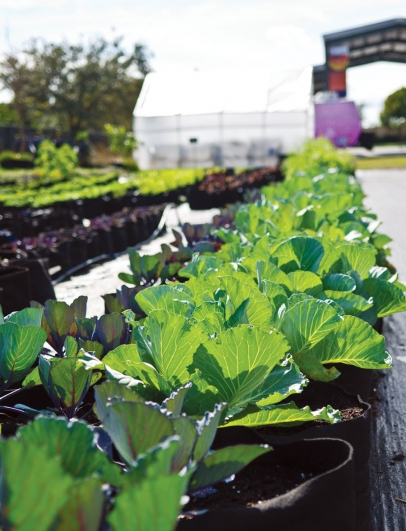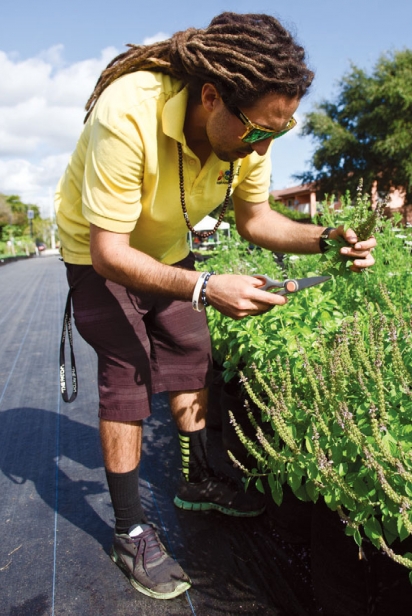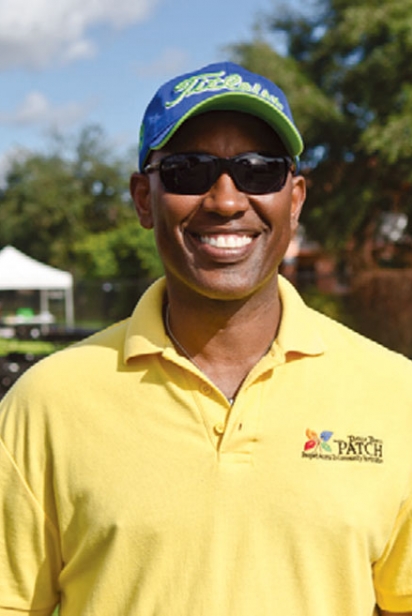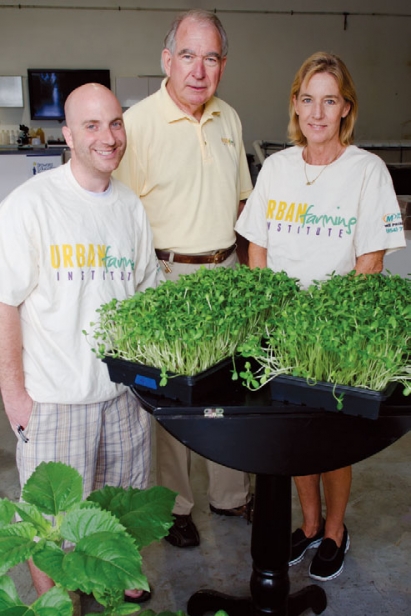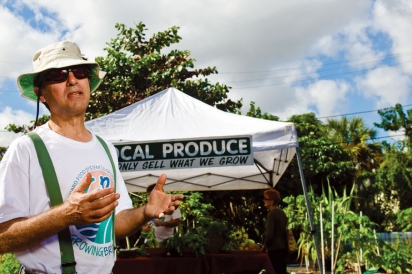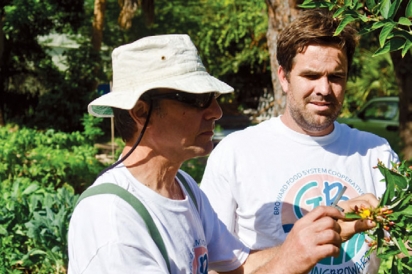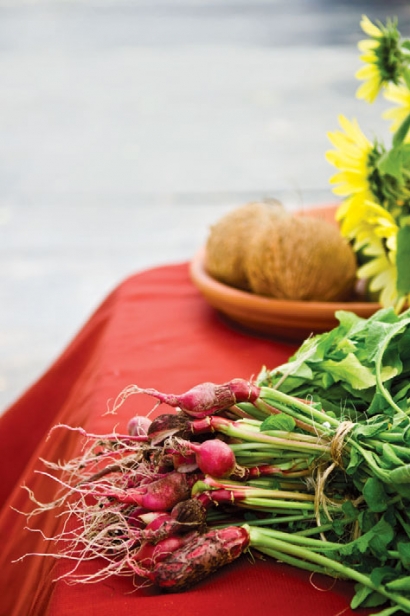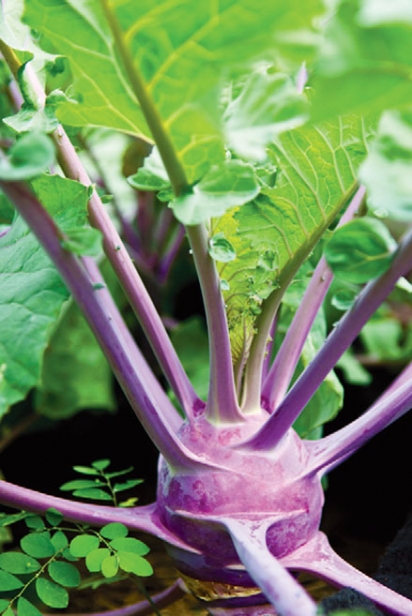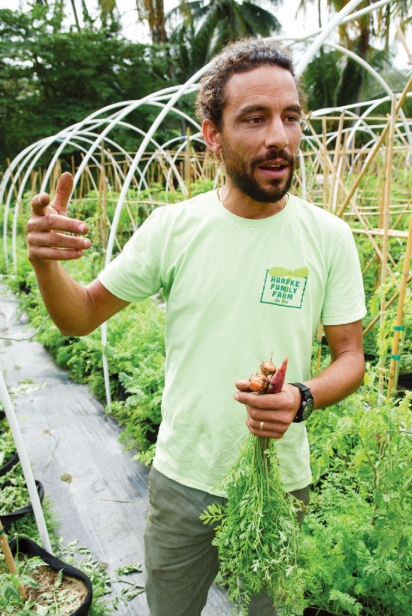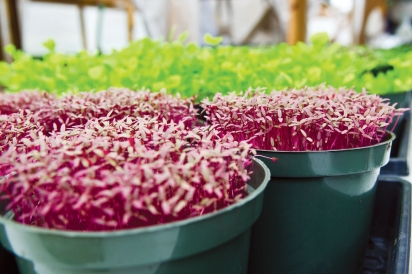Farmers in the City
Urban farms are sprouting up in greater Fort Lauderdale – replacing abandoned lots and former dump sites, and wedged between housing and strip centers. Meet the farmers growing produce in the heart of some of Broward County’s largest cities.
DANIA BEACH PATCH
What was once a city trash dump is now a garden of fruits and veggies. The PATCH (People’s Access to Community Horticulture) Garden is a city-owned garden on a 1.6-acre lot in Dania Beach with 2,500 pots growing kale, peppers, herbs and other produce to sell at the weekly farmers market. When starting the farm, the Dania Beach Community Redevelopment Agency was looking for job opportunities for residents and locally grown healthy food at an affordable price.
“We wanted more than just a community garden. At first, everyone will come out to the garden and be excited, but over time they stop coming so they tend to fail,” says CRA director Jeremy Earle. “I wanted to create a better model.” The local area lacks easy access to fresh food and was labeled a food desert by the U.S. Department of Agriculture. The CRA partnered with TOUCH (Transforming Our Community’s Health) to fund the project and a hired private company, ENO Consulting Group, to manage the farm and weekly farmers market, hoping to create healthier eating habits in the community.
“It’s a habitual thing,” says manager Dion Taylor. “You should eat to nourish your body. That’s been lost in some of these poor communities because they’re just in survival mode. They don’t have time to think about that.”
Dania Beach PATCH Market Garden
1200 NW 1 St., Dania Beach
touchbroward.org/patch
Weekly farmers market offers produce from the PATCH Garden, eggs, baked goods and local honey on Saturdays from 8:30am-noon.
DISCOVERY FARM MARKETPLACE
The city of Oakland Park has a vision of being a culinary hub in Broward, and Discovery Farm Marketplace is only a part of it.
The weekly farmers market, held on Wednesday nights across from Funky Buddha Brewery, is run by the city and Urban Farming Institute, a company teaching Floridians to set up urban farms and grow vegetables locally. They offer local produce and homemade goods and monthly cooking demos from local chefs.
“We focus on food and how to do things very quickly, inexpensively and at home,” says Institute president Jon Albee. “We cover everything from how to plant a seed to the culinary side of what to what to do once it comes out of the garden.” Albee is working with the city to expand Oakland Park’s Culinary Arts District by building Discovery Farm Garden, a community lot in Jaco Pastorius Park for residents to garden and set up their own plots. The District will also include stores and restaurants along the railroad tracks of Dixie Highway north of Oakland Park Boulevard in the same building as Funky Buddha.
“The Culinary Arts District is alive and well and growing,” Albee says. “Oakland Park has really stepped up in the conversation about food and the urban setting.”
Discovery Farm Marketplace
4000 N Dixie Hwy., Oakland Park
opculinaryarts.com
Weekly farmers market every Wednesday 4-8pm, with local produce, baked goods, artisans, a beer and wine garden with live music, and monthly cooking demos.
FLAGLER VILLAGE FARM
Fort Lauderdale’s newest borough, Flagler Village, is packed with trendy restaurants and art galleries. Nestled between newly built apartments and busy traffic is the neighborhood farm.
An abandoned home once stood on the 18,000-square-foot lot before being demolished and renovated into Flagler Village Farm. Today, the garden consists of 2,000 fabric pots and raised beds growing seasonal produce. Founders Michael Madfis and Miguel Afonso run farmers markets twice a week for CSA members picking up weekly shares of produce and walk-ins shopping for greens, local honey and jams.
Before starting the farm, Madfis had a dream of retiring as an architect, moving to the Carolinas and building a self-sustaining garden. Instead, he stayed in South Florida advocating for local food policy change and trying to create an urban farm chain in Broward County.
“The goal wasn’t to be a farmer,” he says. Losing his eyesight to retinal degenerative disease, Madfis thought urban farming would be easier than designing buildings. But working in the harsh Florida sunlight, harvesting and trimming crops turned out to be the opposite. “It’s a dangerous job,” he says.
Luring customers has also been a struggle. “I didn’t realize people don’t eat many vegetables,” he says. “That has been an eye opener. If we were in the northeast and northwest, it’s a different story. But here, food culture is different.” He believes organic grocery stores and healthy restaurants are more convenient than the neighborhood farm. “It’s not important for people to go to the same place every week to get groceries,” he says. “There’s so many other choices.” Madfis is hoping to change eating habits with Growing Broward, a nonprofit organization aimed at linking up local farms and supplying the high produce demand of stores and restaurants throughout the county. “Its purpose is intact,” he says. “Whether or not it’s effective yet is another issue.”
Growing Broward is still in the early stages of gaining membership and support. Future plans include organizing more farm-to-table tours like the one they hosted in November, pushing food policy legislation, and working with farmers. While Madfis is optimistic that Growing Broward and Flagler Village Farm will gain more hype, he’s not holding his breath. “All we really need is one good restaurant to buy all our food, or one charity to sponsor us. I still sort of have that optimism, but I also have to be realistic.”
Flagler Village Farm
601 NE 3 Ave., Fort Lauderdale
fortlauderdalevegetables.com
Locally grown produce, honey, and jams for sale and CSA membership pickups ($25-50) available on Wednesdays 5-8pm and Saturdays 9am-1pm.
HARPKE FAMILY FARM
Claire and Tamer Harpke spent seven years selling fine Italian wines and traveling Europe. But last year, Mr. Harpke turned his backyard hobby of growing herbs and orchids into a fulltime job.
“I’ve always had a passion for growing,” he says. “So I just decided to take a leap of faith and start growing edibles.”
Harpke Farms consists of 2,765 fabric pots and raised beds on part of a three-acre lot in Dania Beach west of I-95 just blocks from Fort Lauderdale International Airport. There you can find a variety of produce, including microgreens, heirloom tomatoes, dragonfruit, bok choy and lacinato kale, tropical fruit trees and even a flourishing breadfruit tree. It’s all fertilized with homemade compost teas made with natural ingredients like fish fertilizers, liquid sea kelp and ocean minerals.
“We do not use any synthetic pesticides or fertilizers whatsoever,” says Mr. Harpke.
The Harpkes also own an organic bistro, Basil Park in Sunny Isles Beach, and used their connections from the wine industry to sell produce to other local restaurants, depending on what’s in season.
“We couldn’t grow enough food to supply even one restaurant,” he says. “It’s amazing how much food Basil Park goes through with the juicing program and vegetable menu, but we try to supply them as much as we can.”
The farm mostly relies on microgreen sales and customers shopping at the farm weekly. “People need to be willing to go out to urban farms, such as ours, that are super conveniently located,” Ms. Harpke says. “Take the time to go out of your way. Don’t just do what’s convenient.”
Buyers can sign up for a CSA and get a weekly basket of produce or order a la carte and in bulk with farm credit on their website.
Harpke Farms
2781 SW 36 St., Dania Beach
harpkefamilyfarm.com
Local produce for sale by appointment daily 7am-5pm. CSA shares range $25-40 a week (3 month/12-wk plan); farm credit costs $300-500.


